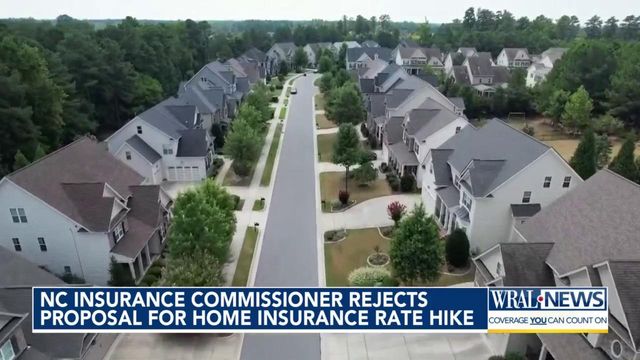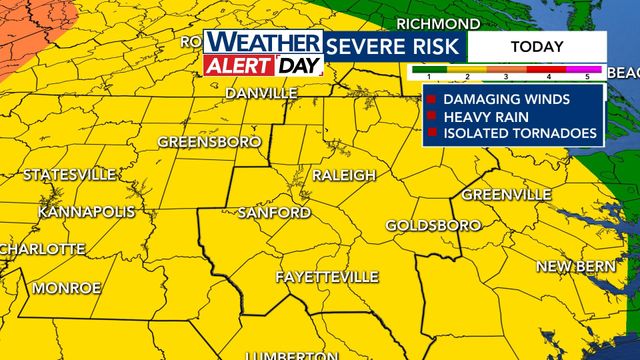NC Insurance Commissioner rejects industry request for 42% hike to home insurance rates
North Carolina Insurance Commissioner Mike Causey has officially rejected the insurance industry's request for a large rate hike to homeowner insurance premiums, he said Tuesday.
Insurance companies frequently petition the state for permission to raise rates, but this year's request was significantly higher than normal: An average of 42% higher rates statewide, driven in part by rates that would nearly double in coastal areas. In Wake and Durham counties, people's rates would increase by an average of 40% under the industry proposal.
The North Carolina Rate Bureau, which made the request on behalf of the insurance companies, has cited two main factors: Inflation driving up the cost of repairs, and climate change causing more frequent and more widespread property destruction, particularly on the coast.
Causey, a Republican who has been in office since 2017 and is running for reelection again this year, said he and his office have received more than 25,000 phone calls, emails and letters from North Carolinians about the proposed rate hikes — including many of the state's elected officials. Nearly all have been opposed, he said, adding that the only comments in favor came from insurance agents and others in the industry.
There's now a court date set for Oct. 7, when the fight between Causey's office and the insurance companies could be heard by a judge to decide what rates should be. However, the issue could also be resolved before then — if the two sides can reach a settlement on a smaller number that both are comfortable with.
"I'd like to see a zero (percent increase)," Causey said. "But I'm willing to listen, if they want to come back with numbers that are more reasonable."
The chief operating officer of the Rate Bureau, Jarred Chappell, told WRAL that they weren't surprised to see Causey shoot down their proposal as part of a negotiating process, but that there's no ignoring the real cost concerns the industry is facing due to inflation and climate change.
"This is an expected step, and part of the rate filing process," he said. "It doesn't preclude settlement talks, and many rate negotiations have been settled before the hearing date arrives. This is an expensive time. Climate change, inflation, the increased frequency and severity of major storms - the very real cost of insuring homes in North Carolina has impacted what we all pay for insurance. Our bureau is responsible for collecting data on claims and that data shows rates need to increase in order to maintain a healthy market in the state."
But for North Carolina residents, it's not just that homeowners insurance might soon go up. Auto insurance rates went up 4.5% in 2023 and are going up another 4.5% this year, WRAL previously reported.
In NC, insurance rates a political issue
There will be another rate proposal showdown over the auto insurance rates in 2025, to be handled by whoever wins the November election for Insurance Commissioner.
Ahead of the general election, Democratic candidates David Wheeler and Natasha Marcus, as well as three Republicans — Causey, Robert Brawley and Andrew Marcus — are fighting for their party's nomination in the March primaries.
On Tuesday Causey posted about the news on social media, citing it as a reason for voters to reelect him.
"The people have trusted me to fight for lower cost for consumers since 2017," he wrote. "I have done just that and will continue to do so as your Insurance Commissioner."
Wheeler, on the other hand, wrote on social media that Causey has approved 19 rate hikes during his seven years in office, and that "I will fight for no rate increases."
David Martlett, an Appalachian State University finance professor who leads the school's Brantley Risk & Insurance Center, said the 42% request from the insurance industry would indeed have been "a big hike" if approved. But it can also be a dangerous gamble to refuse any sort of increase, he said, since there's nothing forcing insurance companies to do business in North Carolina or anywhere else. If they're not making a profit in a certain state, they can always just leave.
"That's what they're doing in California, Florida and Louisiana," Martlett told WRAL Tuesday. "And if they'll leave those states, they'll leave North Carolina. So I think it's a situation everyone needs to take very serious, and hopefully reach some compromise that everybody can live with."
'Companies have got to do a better job'
The last homeowners insurance increase came in 2020. Insurance companies originally wanted to hike rates by 24.5% but eventually agreed to settle for 7.9% after Causey rejected their initial request.
Such negotiations are common. Causey said that in his seven years in office he has always rejected the industry's first request and later settled for something smaller.
But this time feels different, he told reporters Tuesday. Not only is the industry's request so much bigger than normal, he said, he also doesn't think there should be a rate increase at all. Causey mentioned high rates of inflation, saying he's especially concerned for older homeowners since Social Security payouts are only increasing by 3% this year.
"People, some were outraged, some were shocked," he said of the thousands of public comments his office has received on the issue. "And people said they were struggling with the higher costs of groceries and fuel; taxes have gone up."
Causey said it's true that inflation isn't just hitting homeowners, and that insurance companies are feeling squeezed, too.
In December the Insurance Journal, an industry trade publication, reported that in the first nine months of 2023 the nationwide insurance industry saw $32 billion in underwriting losses for property and casualty damages — losses that were largely, though not entirely, due to homeowners insurance claims.
Many companies have reported having to pay out much higher claims in recent years, due in part to the increased cost of construction materials and labor needed for repairs. But insurance companies need to first do a better job of finding other ways of reducing their costs, Causey said, suggesting that they start taking insurance fraud more seriously instead of just passing on those losses to the rest of the homeowners in the state.
"I understand some of the factors involved, but the insurance companies have got to do a better job of rooting out fraud, reporting fraud," he said. "Our office is doing everything we can to go after insurance fraud that's driving up our insurance costs. A lot of these roofing contractor scams, things like that, play into the mix."















